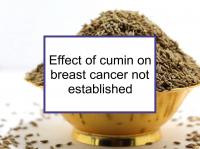Cumin (Cuminum cyminum) is a flowering plant in the parsley family (Apiaceae). Cumin is a traditional ingredient of Indian curry, has been shown to have antioxidant, anti-inflammatory, antibacterial, and anticonvulsant properties. Cumin should not be confused with curcumin, which is the most active ingredient of turmeric (Curcuma longa).
Cumin contains multiple biologically active components, including cuminal, cuminaldehyde, and safranal, as well as apigenin, caffeic acid, chlorogenic acid, cymene, ferulic acid, iron, linalool, and luteolin.
Cancer-related effects of eating cumin
Cumin has been shown to suppress colon carcinogenesis in laboratory rats and carcinogen-induced stomach and cervical tumors in mice. Cumin has been shown to reduce DNA damage and inhibit estrogen metabolism in the laboratory. However, cumin also has been shown to have estrogenic activity, promoting the growth of human breast cancer cells in the laboratory and increasing the uterus size of rats.
Additional comments
While cumin has traditionally been used with some success as a food preservative, it also has been associated with food safety problems in some countries. High levels of mesophilic aerobic microorganisms (a general microbiological indicator of food quality) were found in most of the cumin seed evaluated in a Mexican study which tested glass-packaged, polyethylene-packaged, and unpackaged samples. A study of prepackaged spices marketed in supermarkets and ethnic shops in Lisbon, Portugal, found aflatoxin contamination in all seven cumin samples tested.
A study of spices purchased from popular companies in the Sultanate of Oman found fungal contamination in the cumin samples. A Cuban study found high levels of microorganism and coliform contamination in samples of cumin. In each of the these studies, cumin was the most, or among the most, contaminated of the spices tested. Cumin should be purchased organic.
Black cumin (Nigella sativa) is not related to cumin. However, some types of cumin may be labelled "black cumin."
Sources of information provided in this webpage
The information above, which is updated continually as new research becomes available, has been developed based solely on the results of academic studies. Clicking on any of the underlined terms will take you to its tag or webpage, which contain more extensive information.
Note that while we are continually searching for new evidence specifically concerning cumin and breast cancer, there is not much interest in it among breast cancer researchers, so few directly relevant studies are available.
